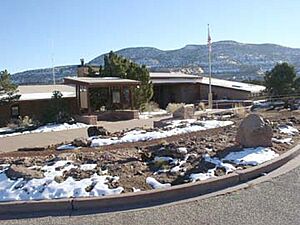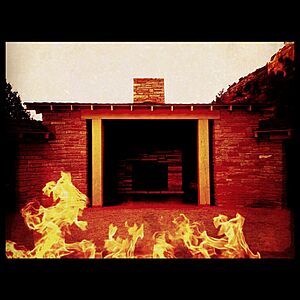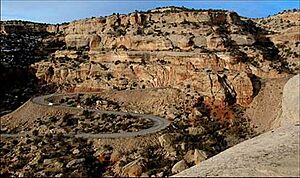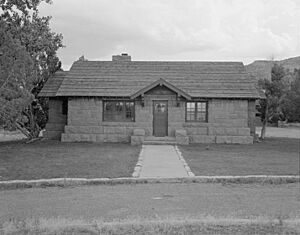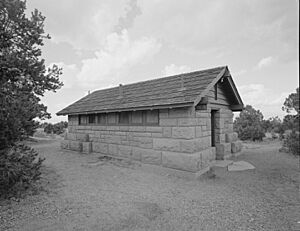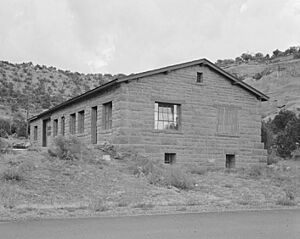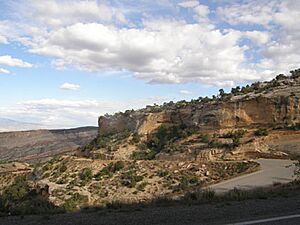National Register of Historic Places listings in Colorado National Monument facts for kids
Colorado National Monument is a beautiful park in Colorado, United States. It's famous for its amazing canyons, towering rock formations, and stunning views. But did you know it's also home to some very special historic places? These places are so important that they are listed on the National Register of Historic Places. This list helps protect and celebrate buildings, structures, and areas that tell us about the past.
There are seven important spots in Colorado National Monument that are recognized for their history. These sites help us understand how the park was built and enjoyed by people many years ago.
Contents
What is the National Register of Historic Places?
The National Register of Historic Places is like a special list of important historical sites in the United States. It's managed by the National Park Service. When a place is added to this list, it means it has a lot of historical, architectural, or archaeological importance.
Being on the National Register helps protect these places. It also makes people more aware of their value. It's a way to make sure these important parts of our history are saved for future generations to learn from and enjoy.
Historic Sites in Colorado National Monument
Colorado National Monument has several places listed on the National Register. These sites show how people worked and lived in the park, especially during the early 1900s. Many of them were built by groups like the Civilian Conservation Corps (CCC) during the Great Depression. The CCC was a program that put young men to work on public projects.
Colorado National Monument Visitor Center Complex
The Colorado National Monument Visitor Center Complex is where many visitors start their adventure in the park. This area includes the main visitor center building. It also has other buildings that help the park operate. These structures were built to fit in with the natural beauty of the monument. They show a special style of architecture often used in national parks. The complex was added to the National Register in 2003.
Devils Kitchen Picnic Shelter
The Devils Kitchen Picnic Shelter is a historic spot where people can enjoy a meal outdoors. It's located in a scenic area of the park. This shelter was built in 1935 by the Civilian Conservation Corps. It's a great example of the rustic style of architecture used in national parks during that time. The shelter was listed on the National Register in 1994. It's a reminder of how people enjoyed the park decades ago.
Rim Rock Drive Historic District
Rim Rock Drive is the main road that winds through Colorado National Monument. It offers incredible views of the canyons and rock formations. The entire drive is considered a historic district. This means the road itself, along with its stone walls, tunnels, and overlooks, is historically important. The Civilian Conservation Corps also played a big part in building this amazing road. It was a huge construction project that took many years to complete. Rim Rock Drive was added to the National Register in 1994.
Saddlehorn Caretaker's House and Garage
Near the Saddlehorn area of the park, you'll find the historic Caretaker's House and Garage. This building was once home to the park's caretaker. This person was responsible for looking after the monument. The house and garage were built in the 1930s. They are good examples of the simple, functional buildings needed to manage a national park. This site was listed on the National Register in 1994.
Saddlehorn Comfort Station
The Saddlehorn Comfort Station is a historic restroom facility in the park. It was also built in the 1930s. Like many other structures from that time, it was designed to blend in with the natural environment. It shows the care taken to provide visitor services while preserving the park's beauty. This comfort station was added to the National Register in 1994.
Saddlehorn Utility Area Historic District
The Saddlehorn Utility Area Historic District includes several buildings that were important for running the park. These buildings include workshops, storage areas, and other utility structures. They supported the daily operations of the monument. This district shows how the park's infrastructure was developed in the mid-20th century. It was listed on the National Register in 1994.
Serpents Trail
Serpents Trail is a historic hiking trail known for its many switchbacks. These are sharp turns that allow the trail to climb steep slopes. The trail was originally built as a road in the early 1900s. It was a very difficult and impressive engineering feat for its time. It's now a popular hiking path that offers a challenging climb and great views. Serpents Trail was added to the National Register in 1994.
These seven historic places help tell the story of Colorado National Monument. They remind us of the hard work and vision that went into creating and preserving this special park.


